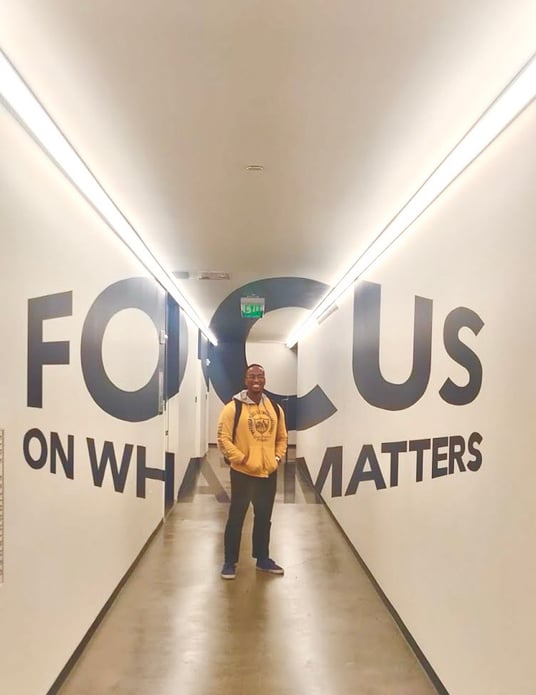Recently, we sat down with Mammadu Diallo, an Apprentice Site Reliability Engineer at LinkedIn, to talk about his journey into a career at LinkedIn, what it means to be a Site Reliability Engineer, and what his day-to-day job looks like. Mammadu also shared some insights with our learners about how his learning at Qwasar helped prepare him for a position with LinkedIn. This is his second interview with us, first as a student and now as an alum.
What is your current position? Tell us a bit about what you do.
I am an apprentice site reliability engineer, also known as an SRE, at LinkedIn via the LinkedIn REACH apprenticeship program. I spend a lot of time learning. There is a lot of information and technology that I haven’t learned and I still don’t know.
On a more serious note, most of my time, apart from learning, is spent trying to automate whatever toils or processes that I can. A toil is whatever process that has to be done but doesn't necessarily add a lot of value. I have to go into a file and rename every line in a file; it has to get done, but spending time doing so for every file individually is a waste of time, so I’m trying to program a solution to reduce toil and reduce repetitive tasks.
I also try to make sure that the infrastructure that my team uses stays up and running. If something happens to the system, then I bring it back online and we try to problem-solve what happened. So really what I do in my position is learn, automate toils, and work on the monitoring and alerts in our system.

How did Qwasar prepare you for doing your job?
Qwasar prepared me in a variety of ways. They prepared me technically and professionally. Technically, getting my feet wet by learning programming topics. Going through the projects forced me to ask myself how to solve the problems by Googling to get more information.
Also being a part of the Qwasar community was powerful because I was able to bounce ideas back and forth. I was also a guardian for a short time. It was great because it allowed me to learn how to teach and mentor. When you have to teach a concept to someone else, you realize your gaps or how well you understand the concept. Professionally, I spent a lot of time within the community working on interview prep. I learned behavioral questions, how to set up myself to answer those questions, and how to set up my resume so it shows the best qualities that I have to offer. Qwasar provided me with lots of preparation and lots of information. It showed me a bunch of opportunities and then prepared me to take the advantage of those opportunities.
How did your experience at Qwasar help you get into your first software job?
First, I actually got a position at 8th Light and worked there for a few months which was an opportunity I learned about through Qwasar. It was a great experience with a nice company. I love those guys. After a few months of working for 8th Light, LinkedIn was another opportunity that came to me through Qwasar. With the professional preparation and creation of my technical portfolio, I was well prepared to pass the interview and accept an offer.
What skills did you learn throughout the program that you find most useful in your position?
I think a lot of it is just becoming familiar with the command line and Unix as an SRE. A lot of your problem-solving is gonna just be on the command line and Qwasar introduced me to a lot of those commands. In fact, I learned so much from that, that when my computer died in March 2021, it was a Windows PC, and I was able to switch to Linux full-time. I used Linux for about a year, which actually came to be really helpful because a lot of my job is literally messing around with Linux machines.
Introduction to the command line was huge, of course, and super useful to my job today. The variety of programming covered, and the concepts that were learned, but more than that was learning how to put programs together, and how to combine different programming concepts to create software. You learn through your projects at Qwasar because you get a lot of peer reviews and feedback such as, “You did the project this one way, that's great, but you really should have broken up your project into three or four different programs to solve the task.” Peer reviews are also a great way to learn how to do things better.
So in summary, I'll say the skills that I learned are probably command line and just how to make a bigger project come together. Also, practice. We do a lot of programming practice and we figure out how to solve the projects together. I'll be honest, a lot of interviewing today is going to be HackerRank at least in the first round or so, and being able to solve that was great. You also learn a bunch of topics from computer science on the side while figuring out how to solve those problems.
In your current position, what are you doing? What are you learning? Are you having to learn a lot quickly?
We're going through a lot of system design and infrastructure-based topics. I have a guideline of what I'm supposed to learn and I'm going through it slowly. I’m learning things such as Linux commands, Python, databases, and system design. My job is to make sure the infrastructure is working properly and monitor it. I have to know how each part works together, and that's where a lot of the system design comes in. What I'm doing now - it's very basic because of my level (I’m still a junior). I spend a lot of time working on deployments so making sure that the updates are subscribed to our fleets of hosts or computers, figuring out why some hosts aren't working the way they're supposed to, etc. When I realize that there are multiple hosts that are not working, I spend my time trying to automate it so that I can put in a bunch of tickets with the hosts so they can end up getting fixed.
Right now our projects are to make a monitoring system for the developers who are onboarding this new system. So again, making more monitoring and alerts so that we know when things go down and then updating and auditing. In my head, I’m thinking I need to learn faster, but I’m glad my team is giving me time to learn at an appropriate pace. I have a lot of space, but a lot of people giving me the energy and input to learn at an appropriate pace. Not too fast, not too slow.
What aspects of our program set you up for success in your position?
Working with peers, working with others, learning from them - that was powerful. You get a lot of information through osmosis. I already talked about professional development as well as technical development. Working through code problems with peers is probably the best. The more you talk to others, the more things they'll bring up that you could learn. Before you can start doing your own investigations, you also really learn how to get really good at Googling your problems like that. It's super important and it's okay to Google your problems.
What was your favorite project while at Qwasar and why?
My_tar was a pretty good project to work on. You’re figuring out how the tar program works, also working with a partner, which helps you learn to work with others and code together. The biggest part is that you’re actually building a project that has multiple moving pieces. With tar, you’re learning “hey, I can make a complex tool to get something done, I can organize my code, and I can make a project!” It helped me to believe in myself and it inspired me to start trying projects outside of Qwasar as well. My_tar was hard! I want to say it took me like three months to make it work.
Do you have any advice for others with career transitions?
It takes courage! Transitions are quite difficult because even for me when I did my career transition, I did the Qwasar program for a year, and wanted to give up often, but changing careers won’t happen overnight. COVID was a weird time, but it definitely gave us time to reflect and realize that we only have one life, and changing to a career we want starts by going for it. I would just say, go for it! If you have significant obligations, I understand - that makes changing careers much harder, but change can still happen, just take it to step by step. I think there's a kind of proverb, you climb a mountain by taking the first step, right? I'll just say, take the first step as a big one.
Another big one is, to continue asking questions and Googling because a lot of the time that is where most of the learning happens. You may wonder, why is this broken? If you look at the error code and Google it, maybe someone can provide some information. You can find a little bit of information that you might not be looking for but solves another problem. Just continue asking questions, Googling, continue learning, and have a learners mindset.
Another thing is just to persevere. You're gonna hit walls, you're gonna get blocks, it's gonna happen. If you need, take breaks and if you take a break, come back. So perseverance is super important. Continue having curiosity and perseverance. Just talk your questions with people too, you'll get a lot of knowledge through osmosis. Talking to Gaetan, the Qwasar CTO, helped me to learn things I didn’t know about, and not just from Gaetan, but from a variety of people as well from the people around you.
Is there anything else you would like to tell us about?
Qwasar is awesome! I kind of want to come back.
We want to thank Mammadu for his time in speaking with us and our students about his career as a Site Reliability Engineer at LinkedIn. He provided valuable insight about making a career transition into the tech industry to our learners.


